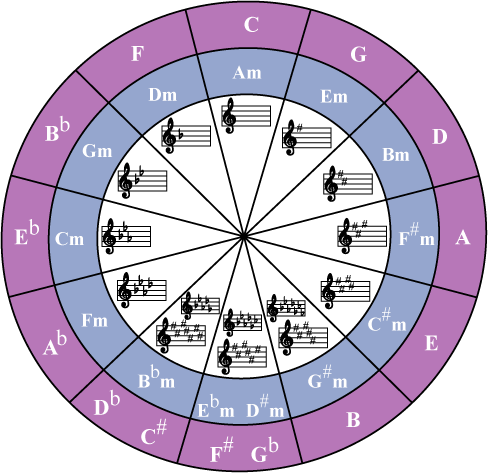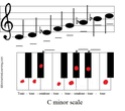Scales list.
+25
Matthieu Stepec
Pianoted
jazzylady
endre
aendym
Cloudy
lesengir
daany
munkuminx
Maki
Amro
Pianokid220
georger
d.chimeraan
nikkey2006
VictorCS
Thomandy
adavidoiu
Jordan
maggiekedves
Phobik2000
pianohama
FtOrReEeSsT
kaburto1966
Admin Andrew
29 posters
Andrew Furmanczyk Piano Academy :: Learn How To Play Piano :: Piano Related Discussions :: Piano Scales
Page 3 of 3
Page 3 of 3 •  1, 2, 3
1, 2, 3
 Re: Scales list.
Re: Scales list.
Pianokid220 wrote:I have been looking for a circle of 5ths pic to download ^_^
Thanks
Here's One :

Another One :


Amro- Well-known Pianist

-
 Number of posts : 340
Number of posts : 340
Age : 33
Job/hobbies : Graphics, Internet & Piano
Length of time playing piano : 2 Years of Trying but seriously from 4 Mnths.
Guru Points : 3
Registration date : 2008-07-17
 Re: Scales list.
Re: Scales list.
I think it's really helpful! I've been looking for the notes for F# minor for a while now!Admin Andrew wrote:FtOrReEeSsT wrote:Wow! This is a huge help for me.
Thanks for posting this!
Really? I thought people would laugh at how basic this information is! Well i'm glad i posted it then!
 Re: Scales list.
Re: Scales list.
You can use Windows lve Skydrive for sharing up to 25GB of free space that won't expire.

Phobik2000- Well-known Pianist

-
 Number of posts : 150
Number of posts : 150
Location : Uk
Job/hobbies : IT
Guru Points : 0
Registration date : 2008-03-05
 Re: Scales list.
Re: Scales list.
Thank you!! I like the chart... actually, I love the chart. Would you mind if I printed it??

munkuminx- Beginner pianist

-
 Number of posts : 9
Number of posts : 9
Location : St. Louis, MO/Edwardsville, IL
Job/hobbies : Full time student
Length of time playing piano : At an estimate, a year and a half.
Guru Points : 0
Registration date : 2009-01-31
 Re: Scales list.
Re: Scales list.
Jordan wrote:maggiekedves wrote:You can count on that
How did I become an Intermediate pianist ??
It's our rank system. It goes by the number of posts you accumulate over the time - once you reach 20 posts you advance to the rank "Intermediate Pianist". The more posts you accumulate, the more ranks are prone to appear on your name. And so far you're doing a great job, Maggie! Like I said before, keep up the great work!
Wow..did not know that it is soooo easy to become an Intermediate pianist

daany- Intermediate Pianist

-
 Number of posts : 27
Number of posts : 27
Location : Innsbruck, Austria
Job/hobbies : student/climbing and learing to play the piano
Guru Points : 0
Registration date : 2009-01-28
 Re: Scales list.
Re: Scales list.
daany wrote:Jordan wrote:maggiekedves wrote:You can count on that
How did I become an Intermediate pianist ??
It's our rank system. It goes by the number of posts you accumulate over the time - once you reach 20 posts you advance to the rank "Intermediate Pianist". The more posts you accumulate, the more ranks are prone to appear on your name. And so far you're doing a great job, Maggie! Like I said before, keep up the great work!
Wow..did not know that it is soooo easy to become an Intermediate pianist....so i don't have to practice the piano anymore just to post here

hehe
 Re: Scales list.
Re: Scales list.
I don't understand anything of what's goin on, not even in the new tutorials videos.. can someone explain it with plain text? my english is bad when speaking. maybe that's why.
So yeah.. I'm at this lesson now, but it's kinda frustrating that i don't get what's goin on , and why it's important, etc ect
So yeah.. I'm at this lesson now, but it's kinda frustrating that i don't get what's goin on , and why it's important, etc ect
lesengir- Beginner pianist

- Number of posts : 14
Guru Points : 0
Registration date : 2009-08-25
 Re: Scales list.
Re: Scales list.
i'm not an expert myself but as i understand it:
the scale is a following of notes that fit together in a certain way.
if you write a song and use a certain scale, then it gets a specific tough to it. like in the G schale where there is no F but only an F# in it.
that brings up a mood other than if the song was with an F.
anyhow. these patterns can be used if you play songs that other people wrote. because you know: okay at the beginning there is the key signature with an F# in it, so i never ever play an F in this song (ofcourse except wenn tihs other sign is there to neutralize the F accidently)
it is actually easier to play if you know what # and b there are.
and then there is the thing with strong notes and weaker notes, it is like a music-law. but that will come in lesson 15 or so (?). it says that in every scale there are certain notes that dominate the others, and if the composer follows these rules the song will end up to be better, than wenn he doesnt obey them. it is a bit complicated because i think there is no explainable reason to it. it is just a fact, like 2+2=4
i hope i got it right, my fellow-advanced-mucisians ?!?
the scale is a following of notes that fit together in a certain way.
if you write a song and use a certain scale, then it gets a specific tough to it. like in the G schale where there is no F but only an F# in it.
that brings up a mood other than if the song was with an F.
anyhow. these patterns can be used if you play songs that other people wrote. because you know: okay at the beginning there is the key signature with an F# in it, so i never ever play an F in this song (ofcourse except wenn tihs other sign is there to neutralize the F accidently)
it is actually easier to play if you know what # and b there are.
and then there is the thing with strong notes and weaker notes, it is like a music-law. but that will come in lesson 15 or so (?). it says that in every scale there are certain notes that dominate the others, and if the composer follows these rules the song will end up to be better, than wenn he doesnt obey them. it is a bit complicated because i think there is no explainable reason to it. it is just a fact, like 2+2=4
i hope i got it right, my fellow-advanced-mucisians ?!?

Cloudy- Intermediate Pianist

-
 Number of posts : 26
Number of posts : 26
Age : 47
Location : Germany and the Netherlands
Job/hobbies : Vet + Mama
Length of time playing piano : since aug.2009
Guru Points : 0
Registration date : 2009-08-24
 Re: Scales list.
Re: Scales list.
i hope i got it right, my fellow-advanced-mucisians ?!?
Sounds pretty good to me, Cloudy
Ive been wondering if one needs a "good ear" to be able to hear if notes sound "good" together or not? Cause for me I can gladly say I can hear if I need a # or a b. But I was wondering if there are people that dont even notice if a # or v is needed.... you know what I mean?

aendym- Well-known Pianist

-
 Number of posts : 208
Number of posts : 208
Age : 43
Location : Germany
Job/hobbies : Teacher - other than that painting, drawing and being creative
Length of time playing piano : August 2009
Guru Points : 13
Registration date : 2009-07-26
 Re: Scales list.
Re: Scales list.
aendym wrote:i hope i got it right, my fellow-advanced-mucisians ?!?
Sounds pretty good to me, Cloudy
Ive been wondering if one needs a "good ear" to be able to hear if notes sound "good" together or not? Cause for me I can gladly say I can hear if I need a # or a b. But I was wondering if there are people that dont even notice if a # or v is needed.... you know what I mean?
Needed for what? I think this is not up for objective decision. Some of today's music 100 years ago would have been classified as "wrong", as "notes don't match" I think...?
endre- Well-known Pianist

-
 Number of posts : 113
Number of posts : 113
Age : 47
Location : Budapest
Job/hobbies : IT
Length of time playing piano : april 09
Guru Points : 1
Registration date : 2009-03-22
 Re: Scales list.
Re: Scales list.
i dont know, i can hear it to. but i have a pretty good feeling for it i guess.
if i hear a song it is not dificult to find out the notes of the leading voice if i try around a bit.
it takes for an average popsong about 5 or 10 minutes.
if i hear a song it is not dificult to find out the notes of the leading voice if i try around a bit.
it takes for an average popsong about 5 or 10 minutes.

Cloudy- Intermediate Pianist

-
 Number of posts : 26
Number of posts : 26
Age : 47
Location : Germany and the Netherlands
Job/hobbies : Vet + Mama
Length of time playing piano : since aug.2009
Guru Points : 0
Registration date : 2009-08-24
 learning scales
learning scales
hi Andrew i understand the circle . now to sight read you have to know the scales .. whats the best way of memorizing them . Do i write them down and learn it that way . on a piece of paper with each page on each scale etc Only the popualr scales as in C F G Eb etc. A lot of music is written using just the 2 notes etc , in the melody the root is played on the chord line or bass .
I have written down the scales .
regards Jazzy lady {Beverley}
I have written down the scales .
regards Jazzy lady {Beverley}
jazzylady- Intermediate Pianist

- Number of posts : 32
Age : 82
Location : melbourne australia
Job/hobbies : sewing , music , listening to live bands
Length of time playing piano : starting learning in 2008
Guru Points : 0
Registration date : 2009-08-12
 Warning!
Warning!
Thomandy wrote:Thanks Alot Maggie. Will be looking into the sites right away
Edit:
E,F#,G#,A,B,C#,Eb,E (http://www.pianoworld.com/fun/vpc/piano_chords.htm)
In the E major scale - Wouldnt it be wrong to say that the E is flat??
It is just a guess, couse if one shold write this down it would look silly!
I was thinking that in a major scale, all notes where sharped?
Ex: E,F#,G#,A,B,C#,D#,E
Well observed, Thomandy. I've found another error on the referred website about chords at pianoworld.com, perhaps more serious.
I read somewhere that the formula for minor scales was
Tone - semitone - tone -tone - semitone - tone- tone.
Accordingly, the C minor scale should consist of those notes:
C - D - Eb - F - G - Ab - Bb - C.
See picture below, click it to see it more clearly.
[img]
 [/img]
[/img]But the application at pianoworld.com yielded the results C,D,Eb,F,G,A,B,C (which is wrong according to the formula!)
So that site cannot be trusted completely!
Finally, if I'm wrong about pianoworld being wrong, please do not hesitate to correct me!

Pianoted- Well-known Pianist

- Number of posts : 154
Location : Iceland
Guru Points : 13
Registration date : 2010-06-08
 Re: Scales list.
Re: Scales list.
Hello!
Actually this confusion comes from the fact that there are 3 kinds of minor scales: natural minor (C D Eb F G Ab Bb C) which is the Aeolian mode; harmonic minor (C D Eb F G Ab B C) which has an altered 7th in order to make a major dominant chord; and melodic minor (C D Eb F G A B C) which alters 6 and 7 in order to make a smoother melodic line. There is even a 4th kind that the Germans call "Zigeuner moll" (gypsy minor): C D Eb F# G Ab B C
Actually this confusion comes from the fact that there are 3 kinds of minor scales: natural minor (C D Eb F G Ab Bb C) which is the Aeolian mode; harmonic minor (C D Eb F G Ab B C) which has an altered 7th in order to make a major dominant chord; and melodic minor (C D Eb F G A B C) which alters 6 and 7 in order to make a smoother melodic line. There is even a 4th kind that the Germans call "Zigeuner moll" (gypsy minor): C D Eb F# G Ab B C
 Re: Scales list.
Re: Scales list.
Thank you Matthieu, for pointing this out.
It looks like our friends at Pianoworld have put the same program code into the application at http://www.pianoworld.com/fun/vpc/piano_chords.htm for minor and melodic scales, because both scales yield the same results, for any key entered. Go ahead and see for yourselves.
I hope I will get my digital piano in a few weeks time and start practising scales, but in the meantime I'm trying to understand them. But should I rather practise melodic minor scales than minor, because Andrew said minor scales were rarely used?
It looks like our friends at Pianoworld have put the same program code into the application at http://www.pianoworld.com/fun/vpc/piano_chords.htm for minor and melodic scales, because both scales yield the same results, for any key entered. Go ahead and see for yourselves.
I hope I will get my digital piano in a few weeks time and start practising scales, but in the meantime I'm trying to understand them. But should I rather practise melodic minor scales than minor, because Andrew said minor scales were rarely used?

Pianoted- Well-known Pianist

- Number of posts : 154
Location : Iceland
Guru Points : 13
Registration date : 2010-06-08
 Re: Scales list.
Re: Scales list.
Man, I don't understand a single word of what is said here. I'll have to practice more theory before getting into it and try my best 'reading' the circle.

L4keoFire- Beginner pianist

-
 Number of posts : 5
Number of posts : 5
Age : 36
Guru Points : 0
Registration date : 2010-02-07
 Re: Scales list.
Re: Scales list.
Have you seen Andrew's music theory videos? If not, then go ahead and watch them and do the homeworks. I love the vidoes, I watched lesson #32 yesterday and it was awesome.L4keoFire wrote:Man, I don't understand a single word of what is said here. I'll have to practice more theory before getting into it and try my best 'reading' the circle.
Rickard- Well-known Pianist

- Number of posts : 146
Guru Points : 14
Registration date : 2010-04-25
 Re: Scales list.
Re: Scales list.
I want things like all these blue scale, pentatonic scale and other scales on key f sharp
Adams motion- Newbie

- Number of posts : 1
Guru Points : 0
Registration date : 2011-02-02
 Andrews list without spaces for use with http://www.random.org/lists/
Andrews list without spaces for use with http://www.random.org/lists/
Hi Folks. I worked with Andrew on a problem I had with practicing the same scales in the same order all the time. He suggested a free site. http://www.random.org/lists/ which works great but since it's a bit tedious to type in all the scale names I've copied Andrew lists without spaces, I then copy and paste it into randomizer and Voila! A new scale order to test my scale knowledge since randomly is how a teacher or a certification board would ask for them. Hope it helps someone.
Here's the link to the site http://www.random.org/lists/
C Major & a minor (no sharps or flats)
G Major & e minor (F#)
D Major & b minor (F#, C#)
A Major & f# minor (F#, C#, G#)
E Major & c# minor (F#, C#, G#, D#)
B Major & g# minor (F#, C#, G#, D#, A#)
F# Major & d# minor (F#, C#, G#, D#, A#, E#)
C# Major & a# minor (F#, C#, G#, D#, A#, E#, B#)
F Major & d minor (Bb)
Bb Major & g minor (Bb, Eb)
Eb Major & c minor (Bb, Eb, Ab)
Ab Major & f minor (Bb, Eb, Ab, Db)
Db Major & Bb minor (Bb, Eb, Ab, Db, Gb)
Gb Major & Eb minor (Bb, Eb, Ab, Db, Gb, Cb)
Cb Major & Ab minor (Bb, Eb, Ab, Db, Gb, Cb, Fb)
Here's the link to the site http://www.random.org/lists/
C Major & a minor (no sharps or flats)
G Major & e minor (F#)
D Major & b minor (F#, C#)
A Major & f# minor (F#, C#, G#)
E Major & c# minor (F#, C#, G#, D#)
B Major & g# minor (F#, C#, G#, D#, A#)
F# Major & d# minor (F#, C#, G#, D#, A#, E#)
C# Major & a# minor (F#, C#, G#, D#, A#, E#, B#)
F Major & d minor (Bb)
Bb Major & g minor (Bb, Eb)
Eb Major & c minor (Bb, Eb, Ab)
Ab Major & f minor (Bb, Eb, Ab, Db)
Db Major & Bb minor (Bb, Eb, Ab, Db, Gb)
Gb Major & Eb minor (Bb, Eb, Ab, Db, Gb, Cb)
Cb Major & Ab minor (Bb, Eb, Ab, Db, Gb, Cb, Fb)
RNewcome- Newbie

- Number of posts : 1
Guru Points : 0
Registration date : 2010-02-15
Page 3 of 3 •  1, 2, 3
1, 2, 3
 Similar topics
Similar topics» Minor scales (three different scales?)
» Scales tempo
» Scales other than the basic ones
» My Song's list. An outline of suggestion of pieces from beginner to the highest grade.
» Scales with metronome
» Scales tempo
» Scales other than the basic ones
» My Song's list. An outline of suggestion of pieces from beginner to the highest grade.
» Scales with metronome
Andrew Furmanczyk Piano Academy :: Learn How To Play Piano :: Piano Related Discussions :: Piano Scales
Page 3 of 3
Permissions in this forum:
You cannot reply to topics in this forum
 How to play piano.ca
How to play piano.ca




» What's Happened...?
» Thomas's Performances - NEW Liszt Moments Musicaux D.01 - Page 39
» latin rhythms on piano
» What is the deal with time signatures with a bottom number of 16?
» Piano Dog's Lick of The Week
» How to span notes
» Great sight reading exercises
» Hey guys! How's it going?